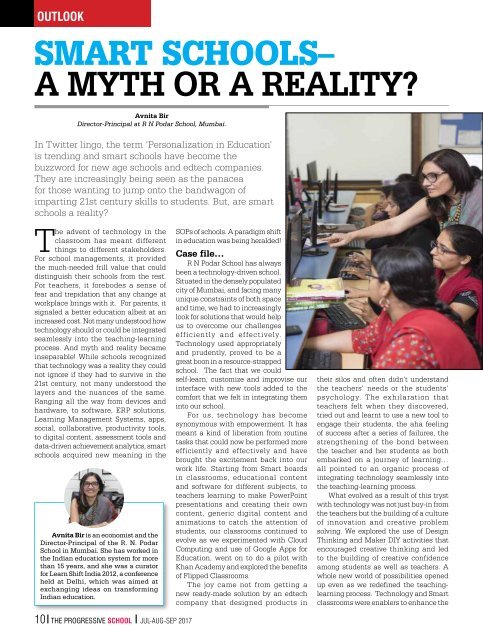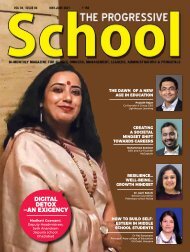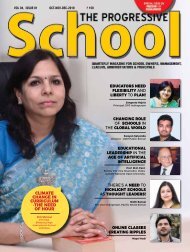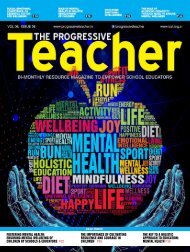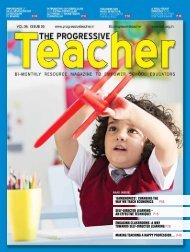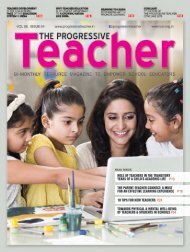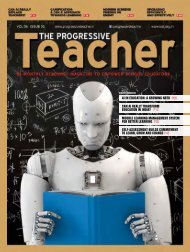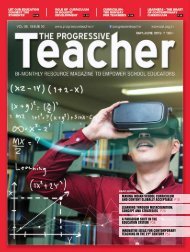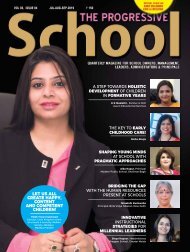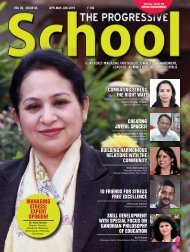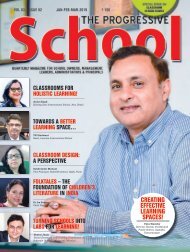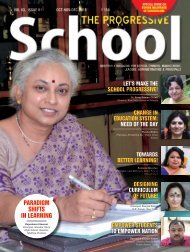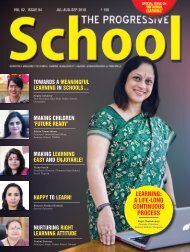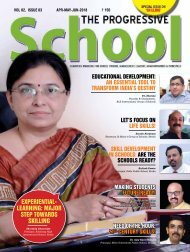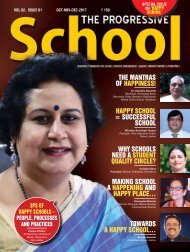The Progressive School Vol 01 Issue 04
The Progressive School is a quarterly magazine for school leaders, school owners, management, administrators and principals. It is set out to provide 'thought leadership' for progress and performance in schools.
The Progressive School is a quarterly magazine for school leaders, school owners, management, administrators and principals. It is set out to provide 'thought leadership' for progress and performance in schools.
Create successful ePaper yourself
Turn your PDF publications into a flip-book with our unique Google optimized e-Paper software.
outlook<br />
Smart <strong>School</strong>s–<br />
a myth or a reality?<br />
Avnita Bir<br />
Director-Principal at R N Podar <strong>School</strong>, Mumbai.<br />
In Twitter lingo, the term ‘Personalization in Education’<br />
is trending and smart schools have become the<br />
buzzword for new age schools and edtech companies.<br />
<strong>The</strong>y are increasingly being seen as the panacea<br />
for those wanting to jump onto the bandwagon of<br />
imparting 21st century skills to students. But, are smart<br />
schools a reality?<br />
<strong>The</strong> advent of technology in the<br />
classroom has meant different<br />
things to different stakeholders.<br />
For school managements, it provided<br />
the much-needed frill value that could<br />
distinguish their schools from the rest.<br />
For teachers, it forebodes a sense of<br />
fear and trepidation that any change at<br />
workplace brings with it. For parents, it<br />
signaled a better education albeit at an<br />
increased cost. Not many understood how<br />
technology should or could be integrated<br />
seamlessly into the teaching-learning<br />
process. And myth and reality became<br />
inseparable! While schools recognized<br />
that technology was a reality they could<br />
not ignore if they had to survive in the<br />
21st century, not many understood the<br />
layers and the nuances of the same.<br />
Ranging all the way from devices and<br />
hardware, to software, ERP solutions,<br />
Learning Management Systems, apps,<br />
social, collaborative, productivity tools,<br />
to digital content, assessment tools and<br />
data-driven achievement analytics, smart<br />
schools acquired new meaning in the<br />
Avnita Bir is an economist and the<br />
Director-Principal of the R. N. Podar<br />
<strong>School</strong> in Mumbai. She has worked in<br />
the Indian education system for more<br />
than 15 years, and she was a curator<br />
for Learn Shift India 2<strong>01</strong>2, a conference<br />
held at Delhi, which was aimed at<br />
exchanging ideas on transforming<br />
Indian education.<br />
SOPs of schools. A paradigm shift<br />
in education was being heralded!<br />
Case file…<br />
R N Podar <strong>School</strong> has always<br />
been a technology-driven school.<br />
Situated in the densely populated<br />
city of Mumbai, and facing many<br />
unique constraints of both space<br />
and time, we had to increasingly<br />
look for solutions that would help<br />
us to overcome our challenges<br />
efficiently and effectively.<br />
Technology used appropriately<br />
and prudently, proved to be a<br />
great boon in a resource-strapped<br />
school. <strong>The</strong> fact that we could<br />
self-learn, customize and improvise our<br />
interface with new tools added to the<br />
comfort that we felt in integrating them<br />
into our school.<br />
For us, technology has become<br />
synonymous with empowerment. It has<br />
meant a kind of liberation from routine<br />
tasks that could now be performed more<br />
efficiently and effectively and have<br />
brought the excitement back into our<br />
work life. Starting from Smart boards<br />
in classrooms, educational content<br />
and software for different subjects, to<br />
teachers learning to make PowerPoint<br />
presentations and creating their own<br />
content, generic digital content and<br />
animations to catch the attention of<br />
students, our classrooms continued to<br />
evolve as we experimented with Cloud<br />
Computing and use of Google Apps for<br />
Education, went on to do a pilot with<br />
Khan Academy and explored the benefits<br />
of Flipped Classrooms.<br />
<strong>The</strong> joy came not from getting a<br />
new ready-made solution by an edtech<br />
company that designed products in<br />
their silos and often didn’t understand<br />
the teachers’ needs or the students’<br />
psychology. <strong>The</strong> exhilaration that<br />
teachers felt when they discovered,<br />
tried out and learnt to use a new tool to<br />
engage their students, the aha feeling<br />
of success after a series of failures, the<br />
strengthening of the bond between<br />
the teacher and her students as both<br />
embarked on a journey of learning…<br />
all pointed to an organic process of<br />
integrating technology seamlessly into<br />
the teaching-learning process.<br />
What evolved as a result of this tryst<br />
with technology was not just buy-in from<br />
the teachers but the building of a culture<br />
of innovation and creative problem<br />
solving. We explored the use of Design<br />
Thinking and Maker DIY activities that<br />
encouraged creative thinking and led<br />
to the building of creative confidence<br />
among students as well as teachers. A<br />
whole new world of possibilities opened<br />
up even as we redefined the teachinglearning<br />
process. Technology and Smart<br />
classrooms were enablers to enhance the<br />
10 THE PROGRESSIVE SCHOOL jul-AUG-SEP 2<strong>01</strong>7


